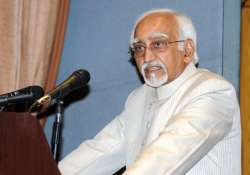Vice president favours voters' right to reject candidate
New Delhi, Jan 25: Vice President Hamid Ansari Friday called for addressing limitations of the country's electoral system and favoured giving the right to reject candidates to voters to boost participation in the election process.Addressing

New Delhi, Jan 25: Vice President Hamid Ansari Friday called for addressing limitations of the country's electoral system and favoured giving the right to reject candidates to voters to boost participation in the election process.
Addressing a function on the third National Voters Day here, the vice president said that although voter participation had improved due to steps taken by the election commission, there was a need to critically examine the experience of the past six decades.
"This would show, firstly, that every citizen entitled to vote does not exercise this right and secondly, that the first-past-the-post system adopted by us often results in the winner obtaining less than a majority of the votes cast," Ansari said.
He said the right to vote, in terms of the democratic theory, carries with it an obligation to exercise the franchise in favour of a candidate of choice.
"A corollary of this would be the right to reject if none of the candidates on the list find favour with the voter. Such a conscious rejection would be preferable to abstention from voting.
"The procedural modality for bringing this about can be worked out on the model of some of the democracies where it is in vogue," he said.
Referring to the first-past-the-post system, he said its limitation was evident from the factual data and the system encourages candidates to focus on securing votes of a segment of the electorate.
"In the first general election in 1952, the percentage of successful candidates who secured less than 50 percent of the votes cast was 67.28. This figure went down to 58.09 percent in 1957. In the 13th, 14th, and 15th general elections in 1999, 2004, and 2009, it was 60.03, 75.87 and 82.68, respectively," he said.
The vice president said conclusion was inescapable that a majority of elected members of the Lok Sabha in recent years, and even earlier, won on a minority of votes cast in their constituencies.
He said the situation was "no better, perhaps worse, in state assembly elections" with percentage of returned candidates on minority of votes cast going above 70 percent in several cases.
Ansari said when this percentage is considered alongside the average voter turnout, it suggests that "the elected representative may not, often is not, representative of the electoral constituency".
"This system encourages candidates to focus on securing votes of a segment of the electorate and accentuate social divisions based on narrower considerations that derogate from inclusiveness and promote divisive tendencies and social conflict.
"For a mature democracy like ours, both these limitations of our electoral system require to be addressed," he said.
Addressing a function on the third National Voters Day here, the vice president said that although voter participation had improved due to steps taken by the election commission, there was a need to critically examine the experience of the past six decades.
"This would show, firstly, that every citizen entitled to vote does not exercise this right and secondly, that the first-past-the-post system adopted by us often results in the winner obtaining less than a majority of the votes cast," Ansari said.
He said the right to vote, in terms of the democratic theory, carries with it an obligation to exercise the franchise in favour of a candidate of choice.
"A corollary of this would be the right to reject if none of the candidates on the list find favour with the voter. Such a conscious rejection would be preferable to abstention from voting.
"The procedural modality for bringing this about can be worked out on the model of some of the democracies where it is in vogue," he said.
Referring to the first-past-the-post system, he said its limitation was evident from the factual data and the system encourages candidates to focus on securing votes of a segment of the electorate.
"In the first general election in 1952, the percentage of successful candidates who secured less than 50 percent of the votes cast was 67.28. This figure went down to 58.09 percent in 1957. In the 13th, 14th, and 15th general elections in 1999, 2004, and 2009, it was 60.03, 75.87 and 82.68, respectively," he said.
The vice president said conclusion was inescapable that a majority of elected members of the Lok Sabha in recent years, and even earlier, won on a minority of votes cast in their constituencies.
He said the situation was "no better, perhaps worse, in state assembly elections" with percentage of returned candidates on minority of votes cast going above 70 percent in several cases.
Ansari said when this percentage is considered alongside the average voter turnout, it suggests that "the elected representative may not, often is not, representative of the electoral constituency".
"This system encourages candidates to focus on securing votes of a segment of the electorate and accentuate social divisions based on narrower considerations that derogate from inclusiveness and promote divisive tendencies and social conflict.
"For a mature democracy like ours, both these limitations of our electoral system require to be addressed," he said.